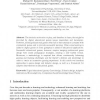Free Online Productivity Tools
i2Speak
i2Symbol
i2OCR
iTex2Img
iWeb2Print
iWeb2Shot
i2Type
iPdf2Split
iPdf2Merge
i2Bopomofo
i2Arabic
i2Style
i2Image
i2PDF
iLatex2Rtf
Sci2ools
116
click to vote
HCI
2007
2007
Immersive Digital Games: The Interfaces for Next-Generation E-Learning?
The intrinsic motivation to play, and therefore to learn, that might be provided by digital educational games teases researchers and developers. However, existing educational games often fail in their attempt to compete with commercial games and to provide successful learning. Often some learning is added to digital games or some gameplay is added to educational applications. Successful educational games, however, require merging professional game design with sound pedagogical strategies, creating a new hybrid format. Moreover, a methodology is required that allows continuously balancing gaming and learning challenges and the learner’s abilities and knowledge in order to retain an immersive gaming experience. In this article we introduce approaches to game design and didactic design, as well as a framework for adaptive interventions in educational games.
Digital Educational Games | Educational Games | HCI 2007 | Human Computer Interaction | Successful Educational Games |
| Added | 29 Oct 2010 |
| Updated | 29 Oct 2010 |
| Type | Conference |
| Year | 2007 |
| Where | HCI |
| Authors | Michael D. Kickmeier-Rust, Neil Peirce, Owen Conlan, Daniel Schwarz, Dominique Verpoorten, Dietrich Albert |
Comments (0)

